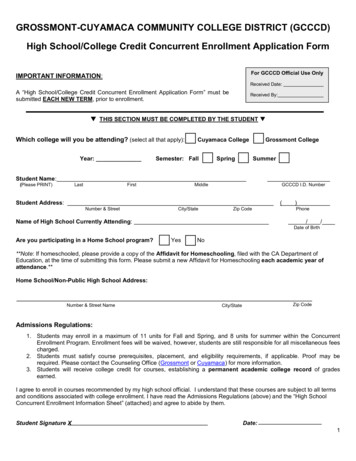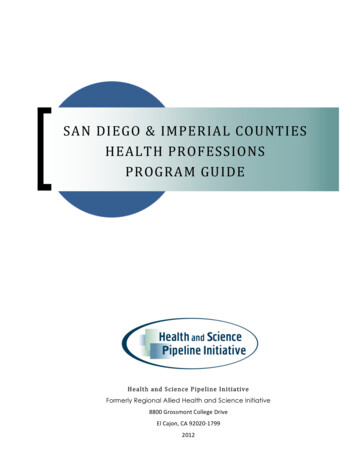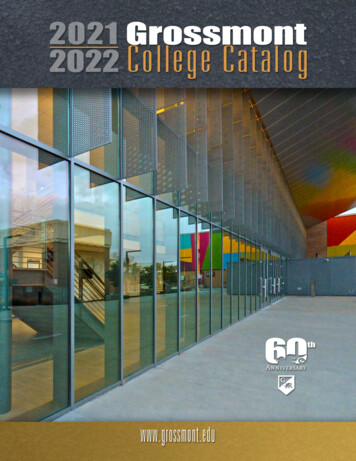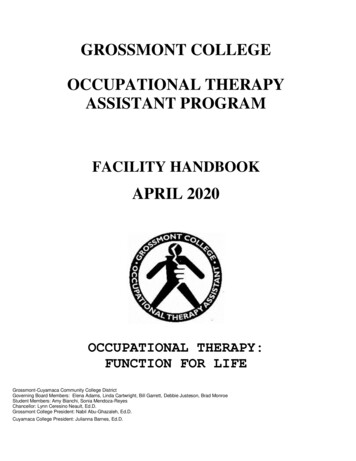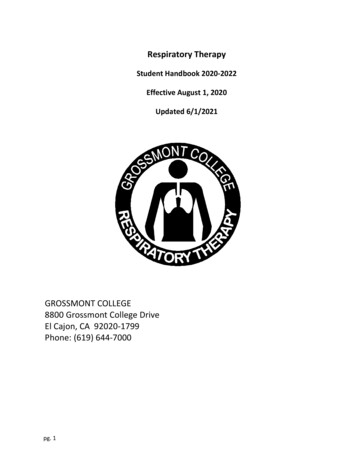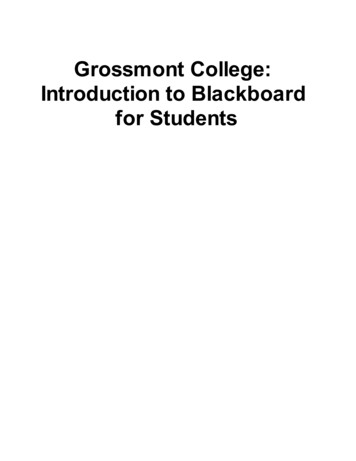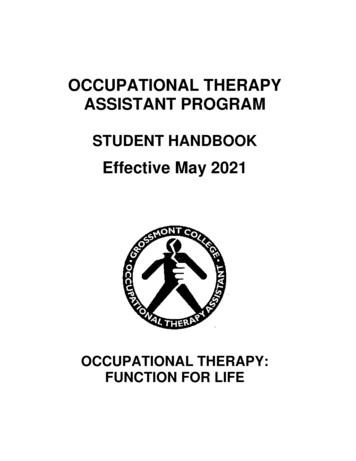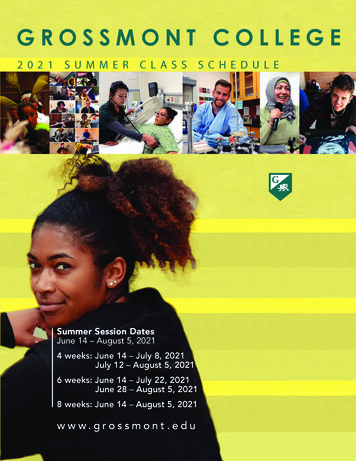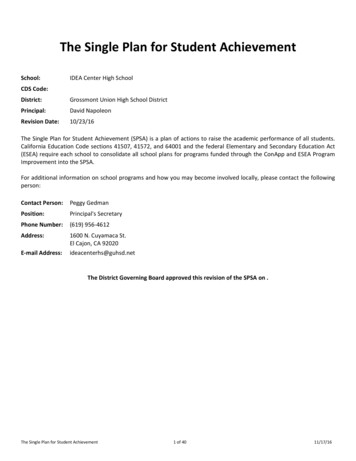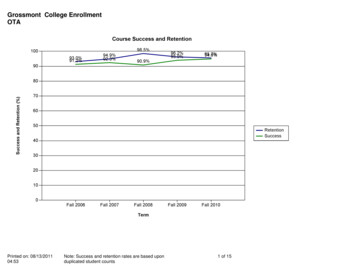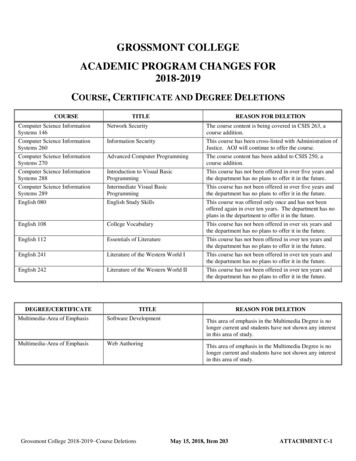
Transcription
GROSSMONT COLLEGEACADEMIC PROGRAM CHANGES FOR2018-2019COURSE, CERTIFICATE AND DEGREE DELETIONSCOURSETITLEREASON FOR DELETIONComputer Science InformationSystems 146Computer Science InformationSystems 260Computer Science InformationSystems 270Computer Science InformationSystems 288Computer Science InformationSystems 289English 080Network SecurityEnglish 108College VocabularyEnglish 112Essentials of LiteratureEnglish 241Literature of the Western World IEnglish 242Literature of the Western World IIInformation SecurityAdvanced Computer ProgrammingIntroduction to Visual BasicProgrammingIntermediate Visual BasicProgrammingEnglish Study SkillsDEGREE/CERTIFICATEThe course content is being covered in CSIS 263, acourse addition.This course has been cross-listed with Administration ofJustice. AOJ will continue to offer the course.The course content has been added to CSIS 250, acourse addition.This course has not been offered in over five years andthe department has no plans to offer it in the future.This course has not been offered in over five years andthe department has no plans to offer it in the future.This course was offered only once and has not beenoffered again in over ten years. The department has noplans in the department to offer it in the future.This course has not been offered in over six years andthe department has no plans to offer it in the future.This course has not been offered in over ten years andthe department has no plans to offer it in the future.This course has not been offered in over ten years andthe department has no plans to offer it in the future.This course has not been offered in over ten years andthe department has no plans to offer it in the future.TITLEREASON FOR DELETIONMultimedia-Area of EmphasisSoftware DevelopmentThis area of emphasis in the Multimedia Degree is nolonger current and students have not shown any interestin this area of study.Multimedia-Area of EmphasisWeb AuthoringThis area of emphasis in the Multimedia Degree is nolonger current and students have not shown any interestin this area of study.Grossmont College 2018-2019–Course DeletionsMay 15, 2018, Item 203ATTACHMENT C-1
COURSE ADDITIONS2018-2019Arabic 161Basic Arabic for Healthcare Professionals1 unit, 1 hour lectureA course leading to basic medical communication and interaction in Arabic. The course provides the healthcareprofessionals with elementary oral skills and exploration of Arabic culture to facilitate communication with Arabicspeaking patients.Communication 126Communication Studies: Health and Wellness3 units, 3 hours lectureThis introductory course provides students the opportunity to study and to apply principles and practices of healthcommunication in a variety of contexts. Students will explore ways in which we communicate about health, cope withhealth-related problems, and influence one another’s health-related behaviors. Specifically, topics cover provider-patientinteraction, health and identity, the role of culture in health, health literacy, health in the work place, support networks,empathy, listening, and health campaigns. This course benefits all students interested in communication studies. Theoverall goal for this course is to prepare students to communicate effectively in their roles as health citizens, patients,personal and professional caregivers or healthcare providers.Computer Science Information Systems 120Computer Maintenance and A Certification3 units, 2 hours lecture, 3 hours laboratoryPreparation for the A Certification exam, an industry-sponsored test that establishes a benchmark level of knowledgeand competence expected of computer service technicians in entry-level positions. A Certification also serves as thefoundation for computer service professionals who are pursuing other valuable industry certifications such as the CiscoCertified Networking Associate (CCNA), Network , and Microsoft Certified Professional (MCP). Students will gain acomprehensive knowledge base in computer hardware, DOS and Windows operating systems, networking basics, printers,and customer service. Hands-on labs using the latest computer components and operating systems provide anopportunity for students to enhance their skills in assembling, disassembling, servicing, troubleshooting, and upgradingadvanced computer and networking systems.Computer Science Information Systems 121Introduction to Cybersecurity3 units, 2 hours lecture, 3 hours laboratoryPractical introductory course intended for those interested in learning about cybersecurity. Lectures, laboratories, andpractical assignments will emphasize skills needed to work effectively in the area of cybersecurity. Some topics include:Internet security basics, hackers, spyware, phishing, spam, zombies, Trojan horses, worms, viruses, wi-fi security, denialof-service, web-blocking, firewalls, proxy servers, operating system security, browser and web security, andcryptography. Includes installation and configuration of security tools and utilities.Computer Science Information Systems 125Network Certification3 units, 2 hours lecture, 3 hours laboratoryRecommended Preparation: A “C” grade or higher or “Pass” in CSIS 110 or CSIS 120 or equivalent.Practical course intended for those interested in learning computer networking with an emphasis on earning theComputing Technology Industry Association’s (CompTIA) Network certification, a foundation-level, vendor-neutralinternational industry credential that validates the knowledge of networking professionals. Earning this certificationdemonstrates that a candidate can describe the features and functions of networking components, and possesses theknowledge and skills needed to install, configure and troubleshoot basic networking hardware, protocols and services. Italso indicates technical ability in the areas of media and topologies, protocols and standards, network implementation, andnetwork support. Throughout the course, theory will be demonstrated and practiced in laboratory exercises. Lectures,Grossmont College 2018-2019–Course AdditionsMay 15, 2018, Item 203ATTACHMENT C-2
laboratories and practical assignments will emphasize skills needed to work effectively in the networking environmentand to earn the Network certification.Computer Science Information Systems 130Windows Server: Installing and Configuring2 units, 1 hour lecture, 3 hours laboratoryPrerequisite: A “C” grade or higher or “Pass” in CSIS 112 or equivalentComprehensive hands-on system administration course focusing on the installation, initial implementation, andconfiguration of Windows server software core services, including: Active Directory (AD) Domain Services, localstorage, file and print services, group policy and server virtualization technologies.Computer Science Information Systems 230Windows Server: Administering2 units, I hour lecture, 3 hours laboratoryPrerequisite: A “C” grade or higher or “Pass” in CSIS 130 or equivalent.Comprehensive hands-on system administration course focusing on the administration tasks essential to administering aWindow server infrastructure, including user and group management, network access, and data security.Computer Science Information Systems 250Introduction to Python Programming4 units, 3 hours lecture, 3 hours laboratoryRecommended Preparation: A “C” grade or higher or “Pass” in CSIS 119 or equivalent.This is an introductory course in Python programming. Topics covered include basic language syntax, functions, controlflow, looping, data types, strings, lists, dictionaries, exception handling, software tools and libraries, and functional vsobject oriented programming concepts. This course is intended for persons with a prior background in any programminglanguage.Computer Science Information Systems 263Security Certification3 units, 2 hours lecture, 3 hours laboratoryPrerequisite: A “C” grade or higher or “Pass” in CSIS 125 or equivalentEntry-level course in network security that addresses the various aspects of designing and implementing a secure network.Designed for students interested in understanding the field of network security and how it relates to other areas ofInformation Technology (IT). Covers materials included in the CompTIA (Computing Technology Industry Association)Security exam.Computer Science Information Systems 264Ethical Cybersecurity Hacking3 units, 2 hours lecture, 3 hours laboratoryPrerequisite: A “C” grade or higher or “Pass” in CSIS 263 or equivalent.This course immerses IT professional in hands-on intensive environments, providing in-depth knowledge and experiencewith current essential security systems. Provides understanding of perimeter defenses and leads to scanning and attackingnetworks; no real networks are harmed. Students learn how intruders escalate privileges and the steps to be taken to securea system. Also covers Intrusion Detection, Policy Creation, Social Engineering, DDoS Attacks, Buffer Overflows, andVirtual Creation. Focus includes legal and regulatory requirements, ethical issues, basic methodology and technical toolsused for ethical hacking and penetration tests. Students establish a pre-test agreement with the enterprise, discover andexploit vulnerabilities, participate as a member of a pen test team and prepare a penetration test report.Computer Science Information Systems 265Computer Forensics Fundamentals3 units, 2 hours lecture, 3 hours laboratoryRecommended Preparation: A “C” grade or higher or “Pass” in CSIS 264 or equivalent.This course introduces the methods used to properly conduct a computer forensics investigation. Topics include ethics,computer forensics as a profession, the computer investigation process, operating systems boot processes and diskstructures, data acquisition and analysis, technical writing, and a review of familiar computer forensics tools.Grossmont College 2018-2019–Course AdditionsMay 15, 2018, Item 203ATTACHMENT C-3
Culinary Arts 105Home Cooking Essentials2 units, 1 hour lecture, 3 hours laboratoryPrerequisite: NonePrinciples and application of home meal preparation and production. Includes effective utilization of time, equipment,finances and personnel. This course is offered on a Pass/No Pass basis only.English 020Support for Freshman Composition1 unit, 1 hour lecturePrerequisite: A “C” grade or higher or “Pass” in ENGL 098 or ESL 119 or equivalent or assessment for ENGL 110.Corequisite: English 120This course is designed to review and reinforce the skills necessary to be successful in English 120 (freshmancomposition). Students will study the elements and principles of composition through the practice of editing and revisingnarrative, expository, and argumentative essays. Students will also be introduced to effective reading skills and strategiesnecessary for the reading of college level material. This course is offered on a Pass/No Pass basis only.English as a Second Language 117Accelerated ESL Composition6 units, 6 hours lecturePrerequisite: A “C” grade or higher or “Pass” in ESL 103 or assessment recommendation for ESL 106.Corequisite: A “C” grade or higher in ESL 117R or concurrent enrollment in ESL 117R.This is an accelerated course in the study of English grammar and writing designed for students whose first language isnot English. In conjunction with ESL 117R, this course develops the academic literacy skills needed to accelerate studentsto English 120. It includes the study of advanced grammar and sentence structure, as well as paragraph and essayorganization and development. Students will practice the writing process by composing essays with effective and accurateexpression. Students will develop their academic literacy by employing advanced techniques of essay and researchwriting with an emphasis on critical thinking, argumentation or other rhetorical strategies, synthesis of research materials,and academic citation.English as a Second Language 117RAccelerated ESL Reading and Vocabulary3 units, 3 hours lecturePrerequisite: A “C” grade or higher or “Pass” in ESL 103 or 103R or assessment recommendation for ESL 106.Corequisite: A “C” grade or higher in ESL 117 or concurrent enrollment in ESL 117.The focus of this course is on the development of a greater understanding, appreciation, and perspective of written worksthrough the analysis of the techniques and purposes of specific writers and genres. Students will continue to practice andmaster various reading strategies and vocabulary skill building employed by independent readers. In addition todeveloping reading comprehension and increasing academic vocabulary, students will improve their ability tocommunicate the information and concepts in course reading materials orally and in writing in ESL 117.Mathematics 096Foundations for Statistics and Quantitative Reasoning6 units, 6 hours lectureThis class satisfies the prerequisite for only MATH 160 or MATH 120. The emphasis of this course will be on thepractical aspects of mathematics and its applications. Topics include: data analysis, sample statistics and graphs, measureof central tendency, simplifying algebraic expressions, problem solving strategies, solving algebraic equations andinequalities, algebraic functions and their graphs. This class is NOT intended for business, science, computer science,engineering, or math majors and is offered on a Pass/No Pass basis only.Mathematics 108Beginning & Intermediate Algebra for Business, Math, Science and Engineering Majors6 units, 6 hours lectureRecommended Preparation: Placement in MATH 90A compressed course that covers elementary algebra and in-depth coverage of intermediate algebra intended for thestudent who has some previous experience with algebra. This course includes topics related to a mathematical foundationfor college students who are majoring in business, math, science and engineering and emphasizes the study of thebehavior and characteristics of linear, quadratic, rational, radical, exponential, and logarithmic functions from graphic,Grossmont College 2018-2019–Course AdditionsMay 15, 2018, Item 203ATTACHMENT C-4
numeric, analytic and applied perspectives. Graphing calculators are required for this course. This course serves as aprerequisite for MATH 120, MATH 125, MATH 160, MATH 170, MATH 175, MATH 176, and MATH 178.Nursing 135Maternal/Newborn Nursing Single Subject2.5 units, 1.5 hours lecture, 3 hours laboratoryThis course is designed for students who have been identified by the California Board of Registered Nursing as needing aMaternal/Newborn course in the United States in order to obtain their California RN license. The students must havecompleted their nursing education obtaining a minimum of a Bachelor’s Degree in Nursing outside of the United States,with subsequent RN licensure in the same country. Building on the knowledge and skills of Nursing Fundamentals, thestudent learns about nursing care of obstetric patient populations. Obstetric nursing addresses the physiologic andpsychosocial changes women and their families experience during pre-conception, pregnancy, birth, and postpartum, aswell as the impact of the childbearing cycle on the family, population health, and outcomes. Environmental factors suchas physical, psychological, social, spiritual and cultural elements are discussed in the way they impact the obstetricpatients and their families. Refinement of critical thinking skills, clinical decision-making, and a focus on growth anddevelopment are emphasized. Concurrent clinical experience is in acute and ambulatory care settings.Nursing 136Child Health Nursing Single Subject2.5 units, 1.5 hours lecture, 3 hours laboratoryThis course is designed for students who have been identified by the California Board of Registered Nursing as needing aChild Health course in the United States in order to obtain their California RN license. The students must have completedtheir nursing education obtaining a minimum of a Bachelor’s Degree in Nursing outside of the United States, withsubsequent RN licensure in the same country. Building on the knowledge and skills of Nursing Fundamentals, the studentlearns about nursing care of pediatric patient populations. Pediatric nursing addresses the nursing management of childrenwith alternations in health, many of which result in chronic illnesses. Environmental factors such as physical,psychological, social, spiritual and cultural elements are discussed in the way they impact the pediatric patients and theirfamilies. Refinement of critical thinking skills, clinical decision-making, and a focus on growth and development areemphasized. Concurrent clinical experience is in acute and ambulatory care settings.Nursing 210Advanced Placement Nursing Bridge Course LVN to RN3 units, 2 hours lecture, 3 hours laboratoryNursing 210 is designed to prepare the licensed vocational nurse for entry into an associate degree nursing program. Thiscourse focuses on the theory and application of concepts of physical assessment, nursing process, critical thinking, and therelationship of homeostatic mechanisms to fluids and electrolytes. Students will learn the professional roles of theRegistered Nurse as clinician, teacher, leader and advocate. This course serves as a bridge for the LVN to the role ofAssociate Degree Nursing student. Simulation will be integrated into the course in order to support clinical educationaimed at improving the student’s ability to recognize and manage patients, promote critical thinking and decision-makingskills, and improve communication and technical skills. The course is offered prior to students entering the third semesterof the ADN program.Grossmont College 2018-2019–Course AdditionsMay 15, 2018, Item 203ATTACHMENT C-5
COURSE MODIFICATIONS2018-2019The following courses reflect changes in either title, description, prerequisite, corequisite, advisories on recommended preparation, hours,and/or units. Other areas (e.g., course objectives, course content, texts) have also been modified to meet Title 5 course standards. Thesemodifications have been carefully reviewed by the Curriculum Committee and are recommended to the Governing Board for approval.PRESENTPROPOSED CHANGESAdministration of Justice 171 A-B-C-DSecurity Academy4 units, 3.5 hours lecture, 1.5 hours laboratoryThe criminal justice system and the role of the security sector:the law and procedures relative to arrest, search and seizure,interrogation, custody, civil liability, and the moral, legal andethical use of force for security personnel. Emphasis is placed onsecurity operations, emergency procedures, public relations,report writing, CPR/first aid, AED techniques, chemical agents,preparation for employment, and career opportunities in contractas well as proprietary security services. Satisfies CaliforniaDepartment of Consumer Affairs, Bureau of Security andInvestigative Services, licensing or requalification requirementsfor guard registration (guard card), baton, exposed firearmspermits for security officers.Business 195Personal Finance3 units, 3 hours lectureThis course explores the theories and techniques of managingpersonal income by setting goals, which will culminate in thedevelopment of a personal plan to manage their financial lives.Topics include financial planning, budgeting, institutionalsavings and checking services, investment analysis, retirementplanning, consumerism, insurance, home ownership, creditmanagement, taxes and estate planning.Computer Science Information Systems 213Intermediate UNIX4 units, 3 hours lecture, 3 hours laboratoryRecommended Preparation: A “C” grade or higher or“Pass” in CSIS 112 and 113 or equivalent.An intermediate course in operating system theory and thecurrent implementation of at least one operating system. Thecourse will include the analysis of general and specificoperating system services and the configuration and installationof operating systems and application suite software suitable fora business or individual. The course will emphasize a ‘projectteam’ approach to the completion of exercises and projects thatrequire hands-on practice.Grossmont College 2018-2019–Course ModificationsAdministration of Justice 171 A-B-C-DChange in course title, unit value, lecture hours, laboratoryhours, and catalog description to:Basic Security Academy3 units, 3 hours lecture, 0 laboratory hoursThe criminal justice system and the role of the security sector:the law and procedures relative to arrest, search and seizure,interrogation, custody, civil liability, and the moral, legal andethical use of force for security personnel. Emphasis is placed onsecurity operations, emergency procedures, public relations,report writing, CPR/first aid, AED techniques, preparation foremployment, and career opportunities in contract as well asproprietary security services. Satisfies California Department ofConsumer Affairs, Bureau of Security and Investigative Services,licensing requirements for guard registration (guard card) forsecurity officers. This course is offered on a Pass/No Pass basisonly.Business 195Change in course title toPrinciples of Money Management for SuccessComputer Science Information Systems 213Change in course title, course units, lecture hours, prerequisiteand catalog description to:Linux System Administration3 units, 2 hours lecturePrerequisite: A “C” grade or higher or “Pass” in CSIS 113 orequivalent.Recommended Preparation: NoneComprehensive hands-on application and instruction in multiuser, multi-tasking operating systems and networked operatingsystems. Topics include: operating system installation andconfiguration, storage configuration and management, serversecurity configuration, user and group management,configuration and management of various server roles (such as:LDAP, DNS, DHCP, Print, Mail, Samba, Apache),troubleshooting, and disaster recovery. Course maps to theLinux Professional Institute (LPI) Certification Level 2 exam.May 15, 2018, Item 203ATTACHMENT C-6
PRESENTComputer Science Information Systems 293Introduction to Java Programming4 units, 3 hours lecture, 3 hours laboratoryRecommended Preparation: A “C” grade or higher or “Pass”in CSIS 110 and 119 or equivalent.An introductory course in Java programming focusing onobject-oriented methodology. The course will include usingobjects from the standard Java Class Library, writing and usingnew objects, developing inheritance hierarchies of classes,using polymorphism to build extendible systems, and thedevelopment of windowed, GUI, event driven applications.Computer Science Information Systems 294Intermediate Java Programming and Fundamental DataStructures4 units, 3 hours lecture, 3 hours laboratoryPrerequisite: A “C” grade or higher or “Pass” in CSIS 293 orequivalent.This course is the continuation of CSIS-293. Students willconcentrate more on the Java techniques available for thedevelopment of large, complex systems. Students will utilize theconcepts of Abstract Data Type to analyze real worldrequirements and design class structures to meet thoserequirements. In particular, students will apply these skills to theunderstanding and use of Data Structures. The course willprogress from arrays, to linear lists, to stacks, queues, deques,and trees. Big-Oh notation will be introduced and used for theanalysis and comparison of algorithms to perform sorting andsearching of the structures. Students will become familiar withdesign techniques and tools (such as UML) necessary to developlarger programs and to contribute to multi-programmer teams.Java will be used extensively in the development of programsolutions.Computer Science Information Systems 295Android Application Development with Java3 units, 2 hours lecture, 3 hours laboratoryPrerequisite: A “C” grade or higher or “Pass” in CSIS 293 orequivalent.This course is intended to give the student basic andintermediate skills in the development of applications for anyAndroid powered smart phone. Students will utilize the Javaprogramming language and a modern Integrated DevelopmentEnvironment (IDE) to analyze and design real worldapplications. They will become skilled in use of the AndroidApplication Programming Interfaces (API’s) to developapplications that exhibit and/or utilize desirable attributes suchas: 1) retrieving Internet data via REST web services; 2) use ofGoogle Maps; 3) location awareness with the ability toutilize/the phone’s GPS APIs; 4) complex Graphic UserInterfaces (GUI) based on and using Android widgets; 5)development of and/or integration with telephony andnetworking applications; 6) sprite animation; 7) open GLgraphics; 8) game development using existing game engines.Grossmont College 2018-2019–Course ModificationsPROPOSED CHANGESComputer Science Information Systems 293Change in catalog description toAn introductory course in Java programming focusing onobject-oriented methodology. The course will includedeveloping fundamental programming constructs, using objectsfrom the standard Java Class Library, writing and using newobjects, developing inheritance hierarchies of classes, usingpolymorphism to build extendible systems, and performing thesubsequent testing and debugging of these programs.Computer Science Information Systems 294Change in catalog description toThis course is the continuation of CSIS 293. Students willconcentrate more on the Java techniques available for thedevelopment of large, complex systems. Students will utilize theconcepts of Abstract Data Type to analyze real worldrequirements and design class structures to meet thoserequirements. In particular, students will apply these skills to theunderstanding and use of Data Structures. The course willprogress from arrays, to linear lists, to stacks, queues, deques,and trees. Big-Oh notation will be introduced and used for theanalysis and comparison of algorithms to perform sorting andsearching of the structures. Students will become familiar withdesign techniques and tools (such as UML) necessary to developlarger programs. Instruction will also focus on object orientedprogramming and its principles of polymorphism, encapsulation,inheritance, collection classes and iteration protocols. Recursionand recursive data searching techniques will also be utilized inthe creation of efficient, optimized algorithms.Computer Science Information Systems 295Change in prerequisite and recommended preparation to:Prerequisite: NoneRecommended Preparation: A “C” grade or higher or “Pass”in CSIS 293 or equivalent.May 15, 2018, Item 203ATTACHMENT C-7
PRESENTCross-Cultural Studies 122(Spanish 122)Spanish for the Native Speaker I5 units, 5 hours lectureFundamentals of spoken and written Spanish for the bilingualspeaker. This course is designed to help Spanish-speakingstudents further improve their oral and written communicationskills. Emphasis on writing, reading comprehension, andvocabulary building at the intermediate level in a culturalcontext. Exposure to the diversity within the cultures of theSpanish-speaking world. This course is designed to provide thebilingual speaker with the linguistic and learning skills requiredfor successfully completing upper division courses in Spanish.This course will be taught in Spanish.PROPOSED CHANGESCross-Cultural Studies 122Change in prerequisite and course description to:English as a Second Language 070ESL I: Introduction to ESL Literacy6 units, 6 hours lectureCorequisite: ESL 071This is the literacy course in the first level of the ESL coursesequence. Students learn to read and write basic English. Theyalso learn basic word, phrase, and sentence grammar. In additionto reading, writing, and grammar, ESL 070 students learnclassroom rules and communication necessary in academicsettings. This course is offered on a Pass/No Pass basis only.(Nondegree credit course)English as a Second Language 071ESL I: Introduction to ESL Communication6 units, 6 hours lectureCorequisite: ESL 070This is the communication course in the first level of the ESLcourse sequence. Students develop basic listening and speakingskills beginning with the sounds of the English alphabet andprogressing to simple word, phrase and sentence levelinteraction. Grammar taught in ESL 070 is practiced andreinforced in ESL 071. They also learn basic classroom cultureand communication necessary for success in academic settings.This course is offered on a Pass/No Pass basis only. (Nondegreecredit course)English as a Second Language 080ESL II: ESL Literacy6 units, 6 hours lecturePrerequisite: A “Pass grade in ESL 070 and 071 or advisoryplacement in ESL 080 or equivalent based on an ESL assessmentprocess.Corequisite: ESL 081This is the second core literacy course in the study of Englishreading, writing, and grammar designed for students whose firstlanguage is not English. Students learn basic reading and writingskills as well as develop an understanding of college culturenecessary for academic success. This course is offered on aPass/No Pass basis only. (Nondegree credit course)Grossmont College 2018-2019–Course ModificationsPrerequisite: A “C” grade or higher or “Pass” in Spanish 121or equivalent.Fundamentals of spoken and written Spanish for the bilingualspeaker. This course is designed to help Spanish-speakingstudents further improve their oral and written communicationskills. Emphasis on writing, reading comprehension, andvocabulary building at intermediate level in a cultural context.Exposure to the diversity within the cultures of the Spanishspeaking world. This course is designed to provide the bilingualspeaker with the linguistic and learning skills required forsuccessfully completing upper division courses in Spanish. Thiscourse will be taught in Spanish. Not open to students with creditin Spanish 220 and 221.English as a Second Language 070Change in corequisite toCorequisite: A “Pass” grade or concurrent enrollment in ESL071.English as a Second Language 071Change in corequisite toCorequisite: A “Pass” grade or concurrent enrollment in ESL070.English as a Second Language 080Change in corequisite and course description to:Corequisite:
Grossmont College 2018-2019-Course Deletions May 15, 2018, Item 203 ATTACHMENT C-1 GROSSMONT COLLEGE ACADEMIC PROGRAM CHANGES FOR 2018-2019 COURSE, CERTIFICATE AND DEGREE DELETIONS COURSE TITLE REASON FOR DELETION Computer Science Information Systems 146 Network Security The course content is being covered in CSIS 263, a course addition.
